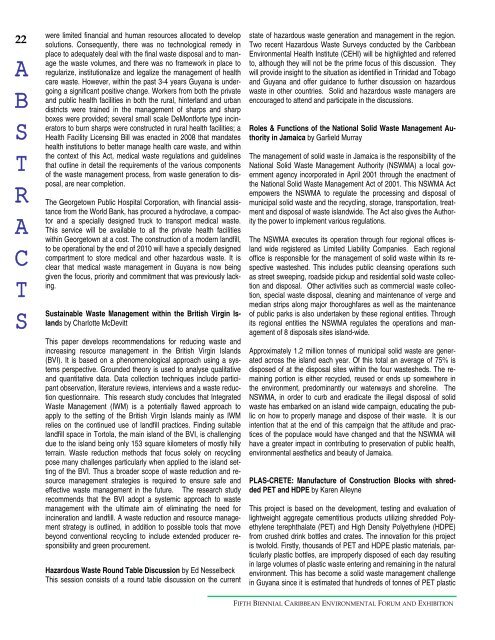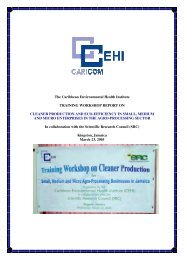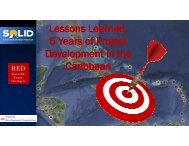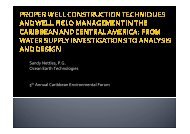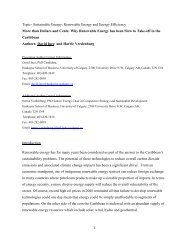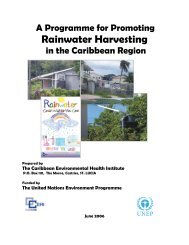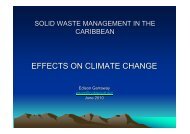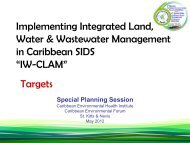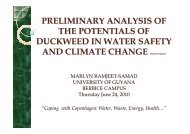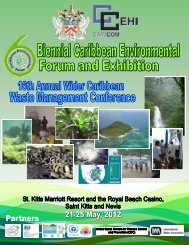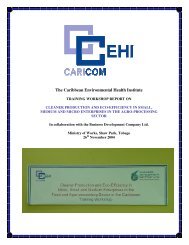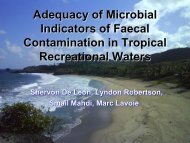conference magazine - Caribbean Environmental Health Institute
conference magazine - Caribbean Environmental Health Institute
conference magazine - Caribbean Environmental Health Institute
You also want an ePaper? Increase the reach of your titles
YUMPU automatically turns print PDFs into web optimized ePapers that Google loves.
22<br />
A<br />
B<br />
S<br />
T<br />
R<br />
A<br />
C<br />
T<br />
S<br />
were limited financial and human resources allocated to develop<br />
solutions. Consequently, there was no technological remedy in<br />
place to adequately deal with the final waste disposal and to manage<br />
the waste volumes, and there was no framework in place to<br />
regularize, institutionalize and legalize the management of health<br />
care waste. However, within the past 3-4 years Guyana is undergoing<br />
a significant positive change. Workers from both the private<br />
and public health facilities in both the rural, hinterland and urban<br />
districts were trained in the management of sharps and sharp<br />
boxes were provided; several small scale DeMontforte type incinerators<br />
to burn sharps were constructed in rural health facilities; a<br />
<strong>Health</strong> Facility Licensing Bill was enacted in 2008 that mandates<br />
health institutions to better manage health care waste, and within<br />
the context of this Act, medical waste regulations and guidelines<br />
that outline in detail the requirements of the various components<br />
of the waste management process, from waste generation to disposal,<br />
are near completion.<br />
The Georgetown Public Hospital Corporation, with financial assistance<br />
from the World Bank, has procured a hydroclave, a compactor<br />
and a specially designed truck to transport medical waste.<br />
This service will be available to all the private health facilities<br />
within Georgetown at a cost. The construction of a modern landfill,<br />
to be operational by the end of 2010 will have a specially designed<br />
compartment to store medical and other hazardous waste. It is<br />
clear that medical waste management in Guyana is now being<br />
given the focus, priority and commitment that was previously lacking.<br />
Sustainable Waste Management within the British Virgin Islands<br />
by Charlotte McDevitt<br />
This paper develops recommendations for reducing waste and<br />
increasing resource management in the British Virgin Islands<br />
(BVI). It is based on a phenomenological approach using a systems<br />
perspective. Grounded theory is used to analyse qualitative<br />
and quantitative data. Data collection techniques include participant<br />
observation, literature reviews, interviews and a waste reduction<br />
questionnaire. This research study concludes that Integrated<br />
Waste Management (IWM) is a potentially flawed approach to<br />
apply to the setting of the British Virgin Islands mainly as IWM<br />
relies on the continued use of landfill practices. Finding suitable<br />
landfill space in Tortola, the main island of the BVI, is challenging<br />
due to the island being only 153 square kilometers of mostly hilly<br />
terrain. Waste reduction methods that focus solely on recycling<br />
pose many challenges particularly when applied to the island setting<br />
of the BVI. Thus a broader scope of waste reduction and resource<br />
management strategies is required to ensure safe and<br />
effective waste management in the future. The research study<br />
recommends that the BVI adopt a systemic approach to waste<br />
management with the ultimate aim of eliminating the need for<br />
incineration and landfill. A waste reduction and resource management<br />
strategy is outlined, in addition to possible tools that move<br />
beyond conventional recycling to include extended producer responsibility<br />
and green procurement.<br />
Hazardous Waste Round Table Discussion by Ed Nesselbeck<br />
This session consists of a round table discussion on the current<br />
state of hazardous waste generation and management in the region.<br />
Two recent Hazardous Waste Surveys conducted by the <strong>Caribbean</strong><br />
<strong>Environmental</strong> <strong>Health</strong> <strong>Institute</strong> (CEHI) will be highlighted and referred<br />
to, although they will not be the prime focus of this discussion. They<br />
will provide insight to the situation as identified in Trinidad and Tobago<br />
and Guyana and offer guidance to further discussion on hazardous<br />
waste in other countries. Solid and hazardous waste managers are<br />
encouraged to attend and participate in the discussions.<br />
Roles & Functions of the National Solid Waste Management Authority<br />
in Jamaica by Garfield Murray<br />
The management of solid waste in Jamaica is the responsibility of the<br />
National Solid Waste Management Authority (NSWMA) a local government<br />
agency incorporated in April 2001 through the enactment of<br />
the National Solid Waste Management Act of 2001. This NSWMA Act<br />
empowers the NSWMA to regulate the processing and disposal of<br />
municipal solid waste and the recycling, storage, transportation, treatment<br />
and disposal of waste islandwide. The Act also gives the Authority<br />
the power to implement various regulations.<br />
The NSWMA executes its operation through four regional offices island<br />
wide registered as Limited Liability Companies. Each regional<br />
office is responsible for the management of solid waste within its respective<br />
wasteshed. This includes public cleansing operations such<br />
as street sweeping, roadside pickup and residential solid waste collection<br />
and disposal. Other activities such as commercial waste collection,<br />
special waste disposal, cleaning and maintenance of verge and<br />
median strips along major thoroughfares as well as the maintenance<br />
of public parks is also undertaken by these regional entities. Through<br />
its regional entities the NSWMA regulates the operations and management<br />
of 8 disposals sites island-wide.<br />
Approximately 1.2 million tonnes of municipal solid waste are generated<br />
across the island each year. Of this total an average of 75% is<br />
disposed of at the disposal sites within the four wastesheds. The remaining<br />
portion is either recycled, reused or ends up somewhere in<br />
the environment, predominantly our waterways and shoreline. The<br />
NSWMA, in order to curb and eradicate the illegal disposal of solid<br />
waste has embarked on an island wide campaign, educating the public<br />
on how to properly manage and dispose of their waste. It is our<br />
intention that at the end of this campaign that the attitude and practices<br />
of the populace would have changed and that the NSWMA will<br />
have a greater impact in contributing to preservation of public health,<br />
environmental aesthetics and beauty of Jamaica.<br />
PLAS-CRETE: Manufacture of Construction Blocks with shredded<br />
PET and HDPE by Karen Alleyne<br />
This project is based on the development, testing and evaluation of<br />
lightweight aggregate cementitious products utilizing shredded Polyethylene<br />
terephthalate (PET) and High Density Polyethylene (HDPE)<br />
from crushed drink bottles and crates. The innovation for this project<br />
is twofold. Firstly, thousands of PET and HDPE plastic materials, particularly<br />
plastic bottles, are improperly disposed of each day resulting<br />
in large volumes of plastic waste entering and remaining in the natural<br />
environment. This has become a solid waste management challenge<br />
in Guyana since it is estimated that hundreds of tonnes of PET plastic<br />
FIFTH BIENNIAL CARIBBEAN ENVIRONMENTAL FORUM AND EXHIBITION


